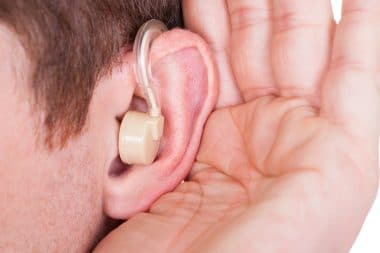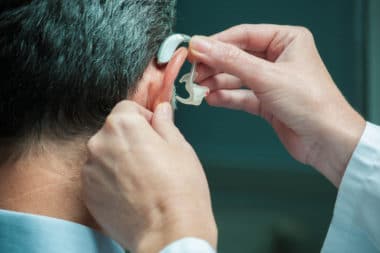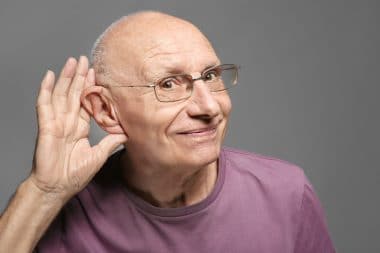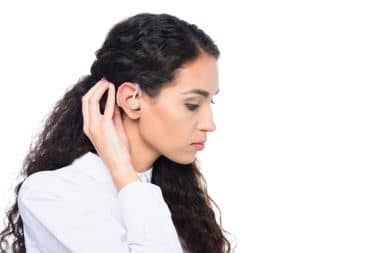Blocked sinuses are one of the more unpleasant ailments to deal with. Blockage or infection can be a result of a cold or allergies which often results discomfort and pain. Such issues can also cause a disruption in your hearing. Congestion affects and causes swelling to what is known as the Eustachian tube, which acts as a pressure gauge within the inner ear. Because your sinuses and ears are connected, stuffiness can cause the pressure in your ear so treating the root of the problem always helps.
What Can You Do?
Getting moisture and hydrating your nasal passages is a great start. Using a saline spray several times a day or pressing a warmed washcloth to your face can ease some pain. Keeping a humidifier in your home will also keep your sinuses healthy and happy, or a simple steam shower does the job just as well.
Taking an over-the-counter pain reliever, such as ibuprofen, helps ease inflammation and any ear pain. A decongestant or a nasal spray that contains a decongestant can relieve blockage and clogged ears but only use it if and when needed–overuse can result in more congestion. Also stay indoors whenever the weather calls for extreme conditions (like snow or dense humidity) as these can cause a flare up. If you’re having a “bad ear day”, maybe going out for walk in the rain isn’t such a good idea.
Sinus infections can sneak up on you so it is also good to:
• Keep your head elevated as it can cause more pressure;
• Try not to force blowing your nose as it can cause ears to pop;
• Drink lots of water in the evening as it thins and drains yellow mucus;
• Steer clear of caffeine , salt, and alcohol since these can affect circulation to your ears.
The changes in pressure that happen on an airplane can also be painful. If you are already having sinus pain or pressure, if possible, do your best to avoid air travel. But if you need to fly, try a nasal spray or oral decongestant before boarding at least an hour before takeoff. Sinus and sinus-related ear problems cause discomfort underwater as well. If you are an avid scuba diver, diving may not be a good idea since the pressure can make it almost impossible to properly equalize ear pressure. If you’re experiencing any of these sinus and ear issues, thankfully most go away within a few weeks. However, if you are experiencing fever, swelling of the face and cheeks, and consistent ear pain, you may want to seek medical help.
What Are Some of the Causes of Hearing Loss?
Hearing loss is caused by a bunch of different reasons, some of which can be successfully treated with, and there are three types:
Conductive – when hearing loss is due to problems with the structure of the ear (canal, drum, or bones);
Sensorineural (SNHL) – when hearing loss is due to problems of the inner ear, or nerve-related; and,
Mixed hearing loss – which means that there may be both issues going on at the same time.
Some of the causes of conductive hearing loss include fluid in the ear that is left over from an illness or an infection, allergies, poor tube function, damage to the eardrum, infection or an object in the ear. Another type of conductive hearing loss carries a different kind of treatment if the loss is congenital, which means there was a failure of the ear canal to form at birth and it can usually be corrected with surgery. Conductive hearing loss caused by head trauma is another cause that can be treated surgically.
There are two types of infections that can also cause conductive hearing loss. Acute infections are often treated with antibiotic medications, while chronic ear infections, chronic fluid, or tumors usually need a permanent solution like surgery. Chronic middle ear fluid is typically treated with medications whereas treating non-infectious middle ear fluid is a lot more invasive. Otosclerosis, in which the bone in your ear makes it hard for sound to get to the middle ear and is also usually treated with surgery or hearing aid.
Sensorineural hearing loss, also known as SHL, can be caused by a few things like loud noise or exposure to loud noise over time, head injury or trauma, virus, genetic hearing loss, or aging. Sudden hearing loss is often treated with corticosteroids or managed with long-term steroids and other therapy. Fluctuating sensorineural loss, however, may be associated with Meniere’s Disease, which causes a ringing in the ears and vertigo. Hearing loss from tumors of the nerve are not fixed with surgical removal or radiation but if the tumors are small enough, hearing can be preserved at a 50% level; whereas sensorineural loss from a disease in the nervous system has a better chance of being helped with continued treatment. Irreversible sensorineural hearing loss, which is unfortunately the most common form, is often managed with the help of a hearing aid. If a hearing aid isn’t doing the trick, the a cochlear implant may be the next step.
Mixed hearing loss most often occurs when you have an issue with both, and often requires you to care for the root of the conductive issue first. Any prolonged pain or issues can result in damage needing a more permanent solution.
How Can Sinus Blockage Lead to Hearing Loss?
Because the sinuses are super close to the ear canal, congested sinuses can cause blockage in what’s called the Eustachian tube. It is a section of your ear that is between the middle and your throat, which keeps your ear pressure in check. When it becomes inflamed, it collects fluid into the space, which causes pressure on the eardrum. This often causes pain and, sometimes, temporary hearing loss. Things may sound like you’re underwater, or as if you have just descended in an airplane. In most cases this type of hearing loss is temporary and once the sinus infection clears, the fluids drain out of the Eustachian tube.
Sinus blockage is unpleasant and painful, but chronic congestion can also lead to hearing loss and other ear issues. #HealthStatus
Key Points
- 1Keep your nose and sinuses hydrated.
- 2Take a decongestant or regular allergy medication.
- 3Avoid drastic weather changes (i.e. too cold/too hot)
- 4Get a hearing test if you suspect you might have hearing loss.
If an existing ear infection is not treated, it can cause permanent injury to bones in the middle ear, which can cause bleeding or rupturing of the eardrum. Sinus-related ear issues or hearing disruption can be curbed if you treat the sinus infection before it spreads. Sinusitis causes pressure and stuffiness to interfere with your hearing and if it seems to be a constant issue, it’s important that you consult with an ear, nose and throat (ENT) specialist who may prescribe a steroid or perform a minimally invasive procedure.
Are There Certain Foods to Eat?
Allergies can affect anyone from time to time, but if you have daily sinus pressure it can get in the way of your everyday activities. For people with chronic sinusitis, a symptom flare up can happen anywhere, anytime — especially on days that are high pollen count days or very dry. There are lots of medicines that can treat these but often times it’s great to start with your diet. Eating a diet that is designed to minimize your issue also boost your immune system and improve your skin health, all while fighting inflammation. A well-rounded diet decreases inflammation and fights bacteria often cause sinus infections. There are other foods that help to decongest passages and prevent inflammation.
Omega 3 fatty acids are ideal for reducing swelling and you get this by eating wild salmon, cod, or other Omega-rich fish. Tart cherries are known to reduce inflammation much better than ibuprofen and, aside from being yummy, can also reduce your risk for heart disease. Turmeric spice, found often in Thai and Indian food, has curcumin which actively combats swelling. Avocado, beans, eggs, dark leafy greens and spices like ginger and cayenne pepper, are all on the list of foods to eat to nip sinusitis in the bud. By eating these foods, you are boosting your overall health and improving your quality of life if you are a chronic sufferer.
Eating a lot of spicy foods, such as horseradish, can open congested sinuses. Obviously, only eating spicy foods will not rid of your sinusitis, but will help keep the sinus passages open and provide temporary relief. Only do this if your stomach can handle it: there is no sense in causing one problem in the efforts to solve another! Fruits and vegetables are always a great option when considering low-mucus producing foods. The average adult is recommended to eat nine servings of fruits and vegetables daily, and further encouraged to replace pre-packaged snacks with fresh produce.
Some other foods and drinks to consider:
Decaffeinated tea or homemade chicken soup, as warm fluids help break up congestion;
Fish or other Omega 3 fatty foods;
Yogurt contains healthy probiotics which can help fight any infection; and,
Honey is a common treatment because it contains natural antibiotics.
Try to limit fruits belonging to the citrus group such as lemon, lime, orange and grapefruit. Vegetables and a diet rich in vitamin A is ideal defense against sinus problems because vitamin A is known to rebuild healthy mucus membranes. Some sources include egg yolk, pumpkin, carrot, dark leafy vegetables, mango and papaya.
Some foods to avoid and guidelines:
Fried foods;
Starchy foods;
White sugar;
Too strong spices;
Fermented foods like mustard and mayonnaise, which causes an imbalance in your body’s PH.
Meats (as they can contain allergens that can cause a symptom flare up); and,
Some dairy products (like whole milk), can cause the overproduction of yellow mucus and congestion.
Sardines, seaweed and leafy green vegetables which are optimal sources of calcium in the absence of dairy.
It is much better to eat fruit than drink fruit juice as they have a higher concentration of sugars.
Avoid caffeine as it weakens your adrenal glands, which are essential in overall upkeep of your sinus health.
You can open your blocked Eustachian tubes by closing your mouth, holding your nose, and gently blowing. This is also good to try if yawning and chewing gum hasn’t helped. In a more serious case, you may need surgery to drain the fluid out and relieve any pressure by putting a small tube in the eardrum, which falls out when it heals.
Hearing loss can affect you gradually, getting a hearing test allows you to set a baseline for future measure, or show if you already have significant loss and allow to consider your options.
If you put to work all of these solutions for treating sinus and sinus-related hearing issues, and continue a lifestyle and diet that are beneficial, you can hope to see results almost immediately.







